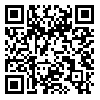
 , Mohammad Moradi joo
, Mohammad Moradi joo 
 , Seyed mansour Raygani
, Seyed mansour Raygani 
 , Ali Mashhadi
, Ali Mashhadi 
 , Imanollah Bigdeli
, Imanollah Bigdeli 

Background: Major depression disorder is one of the most common psychiatric disorders which is associated with impairment in cognitive functions, including working memory. In recent decades, a non-invasive and painless technique, called Repetitive Transcranial Magnetic Stimulation (rTMS) has been used in treatment of treatment-resistant depressions. Current study was conducted to investigate the effectiveness of rTMS in working memory of patients with treatment-resistant major depressive disorder.
Materials and Methods: This randomized, double-blind clinical trial was conducted on 20 patients with treatment-resistant major depression. Participants were randomly divided into two case (n = 10) and control (n = 10) groups and underwent 10 therapeutic sessions of rTMS within 6 weeks. Working memory was evaluated before the intervention and immediately after the last session by n-back test. Mean and Standard deviation of both groups were analyzed with the U Mann-Whitney test before and after intervention.
Results: Repetitive Transcranial Magnetic Stimulation (rTMS) over the left Dorsolateral Prefrontal Cortex (DLPFC) led to the treatment of major depression. Also working memory improved immediately after the end of intervention in the case group compared to sham. Depression scores in active group before performing rTMS (32.90±2.76) and after rTMS (24.40±4.5) was statistically significant (p<0.01).
Conclusion: Repetitive Transcranial Magnetic Stimulation (rTMS) is a non-invasive and safe method which is applied in treatment of treatment-resistant depression. Comprehensive assessment and effective treatment requires attention to patients' cognitive performance within mood symptoms.
Received: 2016/10/13 | Accepted: 2017/06/7 | Published: 2017/08/9
| Rights and permissions | |
 |
This work is licensed under a Creative Commons Attribution-NonCommercial 4.0 International License. |
